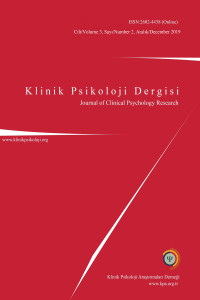Türkiye’de Psikoloji etiği öğretimi: Bir uygulama çalışmasının etik davranış, ahlaki değerler ve etik kuralları benimseme açısından değerlendirilmesi
Abstract
Bu çalışmada, bir etik kitabında önerilen müfredat, uygulama ve egzersizlerin yapılması durumunda, öğrencilerin etik davranış, ahlaki değerler ve etik kuralları benimsemeleri üzerindeki değişimin değerlendirilmesi amaçlanmıştır. Bu doğrultuda, etik dersi alan ve almayan öğrenci gruplarına, ders döneminin başında ve sonunda Etik Davranış Ölçeği (EDÖ), Değerleri Belirleme Testi (DBT) ve Psikoloji Bölümü Etik Kurallar Anketi uygulanmıştır. Dönem başında yapılan uygulamada, EDÖ sonuçlarında bu gruplar arasında farklılaşma bulunmamıştır. Dönem sonunda yapılan uygulamada, etik dersini almış öğrencilerin dersi almamış öğrencilere oranla eylemsiz yanıtlarının anlamlı derecede düşük olduğu, süpervizyon yanıtlarının ise anlamlı derecede yüksek olduğu tespit edilmiştir. Grupların kendi içlerinde dönem başındaki ve dönem sonundaki test sonuçları karşılaştırıldığında, dersi almış öğrencilerin EDÖ eylemsiz cevaplarının son testte anlamlı bir şekilde azaldığı; EDÖ uyarıcı yanıtlarının anlamlı bir şekilde arttığı saptanmıştır. Dersi almamış olan öğrencilerin ise dönem başı ve sonundaki testlerinde EDÖ’ye verdikleri yanıtların farklılaşmamış olduğu görülmektedir. Dersi alan ve almayan öğrencilerin DBT dönem başı ve sonu test sonuçlarında farklılaşma tespit edilmemiştir. Ancak kendi içlerinde farklılaşma olduğu saptanmıştır. Dersi alanların dönem sonu test uygulamasında geleneksellik sonrası şema puanlarının anlamlı bir şekilde arttığı, dersi almayanların da dönem sonundaki test uygulamasında normları koruma şema puanlarının ve geleneksellik sonrası şema puanlarının anlamlı bir şekilde arttığı belirlenmiştir. Cevapların yüzdelik olarak değerlendirildiği Psikoloji Bölümü Etik Kurallar Anketi sonuçlarına göre ise, öğrencilerin ders bağlamında özellikle Psikolojide yayın etiğinin önemini öğrendikleri anlaşılmaktadır. Sonuçlar, genel olarak Etik dersini almanın öğrencilerin etik değer ve bilgileri edinmeleri ve etik konusunda daha etkin olmaları açısından önemini ortaya koymaktadır.
Teaching Psychology ethics in Turkey: The evaluation of a study in terms of adoption of ethical behavior, moral values and ethical rules
Abstract
The aim of the present study was to evaluate the change on adoption of ethical behavior, moral values and ethical rules of students as a result of following the ethics curriculum, class practices, and exercises as suggested by an ethics book. Those participants who took the course and those who didn’t were given Ethical Behavior Inventory (EBI), Defining Issues Test (DIT) and Psychology Department-Ethical Rules Questionnaire at the pre-test and post-test. There was no significant difference in EBI between the groups in the pre-test. In the post-test, students who took the course scored significantly lower in passive answers and significantly higher supervision need answers compared to the other students who didn’t take the course. Comparison of pre-test and post-test results within students who took the course showed that passive answers decreased and warning others’ answers increased significantly. Students who didn’t take the course showed no significant difference in EBI in terms of the pre-test and post-test level. Comparing pre-test and post-test applications of DIT showed no significant difference between groups, but there was a significant difference within the groups. Indeed, students who took the course showed an increase in post-conventional schema scores, whereas students who didn’t take the course showed a significant increase in protecting norms schema level and increase in post-conventional schema scores at post-test. According to the results of Psychology Department-Ethical Rules Questionnaire, in which the answers were evaluated as percentages, it is understood that the students have learned the importance of ethical rules of psychology publication. Taken together, results demonstrated the importance of taking an ethics course on the acquisition of ethical values and knowledge as well as being more active in terms of ethics.
Details
| Primary Language | Turkish |
|---|---|
| Subjects | Clinical Psychology |
| Journal Section | Research Articles |
| Authors | |
| Publication Date | December 25, 2019 |
| Submission Date | March 12, 2019 |
| Published in Issue | Year 2019 Volume: 3 Issue: 2 |


